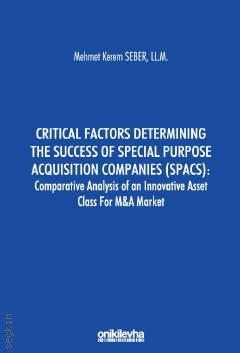>
Hukuk Kitapları>
Ticaret Hukuku>
Şirketler Hukuku>
Critical Factors Determining The Success of Special Purpose Acquisition Companies (SPACs):

Critical Factors Determining The Success of Special Purpose Acquisition Companies (SPACs):
Comparative Analysis of an Innovative Asset Class for M&A Market
1. Baskı,
Temmuz 2022
Kitabın Detayları
Dili:
İngilizce
Ebat:
16x24
Sayfa Sayısı:
53
Kitabın Fiyatı:
70,00₺
Temin süresi 2-3 gündür.
Kitabın Açıklaması
Special Purpose Acquisition Companies, typically known in the marketplace as 'SPACs', are innovative investment vehicles providing financial resources for M&A transactions from capital markets. The past two years have seen the US SPACs explode in popularity to such a degree that they substantially surpass traditional IPOs in 2021 representing almost 60% of the total new listings.
As part of the need for understanding this trajectory, this book focuses on what the determinants of the US SPACs' success are, which ones are associated with failure and based on these findings, if it is possible to suggest a list of metrics to describe what a model of successful SPAC would look like. The book also provides a general overview of the Turkish regulatory landscape pertaining to SPACs and analyses the reasons why SPACs have remained an untested asset class, which prompted the author's second research question as to whethernot there are any regulatory and contractual improvement areas for the Turkish SPACs, and whether it is possible to offer some key recommendations to practitioners and regulators to increase the attractiveness of the Turkish SPACs.
Kitabın Konu Başlıkları

Evolution and The Typıcal Lifecycle of The Us SPACs

Critical Success Factors of The Us SPACs

An Untested Asset Class: Turkish SPACs
Kitapla İlgili Kategoriler
Hakkımızda
|
Uluslararası Yayınevi Belgesi|
Kaynakça Dosyası|
Kişisel Verilerin Korunması |
Üyelik|
Siparişlerim|
İade Politikası|
İletişim


